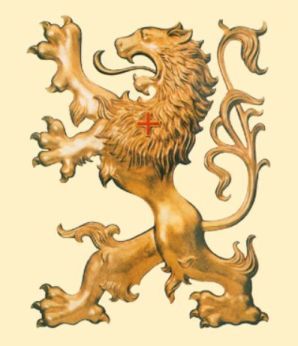|
Plinio Corrêa de Oliveira
On the Airplane with Gogo
Folha de S. Paulo, 20th June 1971 (*) |
|
|
I boarded the airplane for Rio and took my seat. As the plane ascended, I picked up a newspaper to pass the time, but it was uninteresting. For lack of anything better, I turned to look at the passenger at my side, who was a somewhat uncommon type of man. His long neck atop a lanky body supported an unexpected head. His face was round and enormous, but his cranial structure from front to back was exceptionally shallow. One might say that his head was like a coin, with one side bearing the eyes, nose and mouth of a man, and the reverse sporting a full head of gray hair. Between these two sides was a small area from which jutted two ears. His slightly protruding eyes were inexpressive. His lower eyelids, drooping and swollen, were etched with deep lines. Noticing my gaze, he looked at me and asked in a slow and well-timbered voice: "Plinio, do you remember me?" He was obviously an acquaintance of times long past, some childhood companion perhaps. While stalling for time with the classic evasive remarks, "Imagine that!" "It's been such a long time!" and so forth. I was forcing myself to make an archaeological exploration to see what figure from the past I could reconstruct based on these ruins. However, I could find nothing – until the moment that my gaze fell by chance upon his neck where a pointed lump was rapidly ascending and descending. Around this lump everything fell into place and became clear. "Gogo!" I exclaimed, "How are you?" He laughed happily. We shook hands warmly and began to converse. Godfrey Gondra de Godoi Gomes was the full name, not lacking a certain pomp, of my childhood acquaintance. Obviously, his classmates had simplified the name, nicknaming him Gogo. What had become of this Gogo? What was his occupation? What did he do in life? All these facts were lacking to me in conversing with the man. I knew more about his sister, Maria Gondra de Godoi Gomes, or, Maria Gondra, as she was more commonly called. With the cruelty of children, her classmates had dubbed her Maria Gondola, thus insinuating that, by her corpulence, she occupied the space not of a little girl, but of a gondola. Maria Gondola and Gogo were very close. She had more personality and exerted a strong influence over him. Maria Gondola became a nun around 1945, and she soon became involved in the nascent progressivist movement. As was the style in that era, she took part in protests, and confrontations with the police, and was "counseled" to study abroad. When she returned, she was aggiornata from head to toe. She no longer wore any vestige of a religious habit and began to live in an apartment by herself. Was she still a nun? I do not know. Nor do I know if she herself knows. The stewardess passed by, offering coffee. Gogo accepted, and began to sip his coffee. Stimulated by the drink, he began to converse: Gogo: "Well, Plinio, Maria and I often reminisce about our past and we also speak of you and what you are doing – with your books, your campaigns, your 'TPF'!" I: "No, Gogo, you are wrong, for the TFP is not mine. Rather, I belong to it – and with my whole soul. And as for its name, you have also mixed things up. It is not the 'TPF,' but the TFP: Tradition, Family and Property." Gogo: "Yes, yes, I know, I know! Maria and I often speak of the 'TPF.' At first, I would correct her, but she said that in her circles everyone made it a point to say only 'TPF.' Counter propaganda, you see? Spite. So now she has gotten into the habit of always calling it this." Gogo smiled with a kind of hollow malice that attempted in vain to be ardent. I don't know but that perhaps at that moment he himself felt this vacuum. At any rate, as if to add more substance to his words, Gogo added: "The one who feels passionately about this is my sister, for she is intelligent." As for intelligence, Gogo had a certain amount of reasoning capacity, but his "passionate" sister had quite a bit. Moreover, she was always a real rabble-rouser. I : "So, Gogo, your sister doesn't like the TFP then? And you don't either?" Gogo: "Frankly, no. I am absolutely against tradition. Each generation that comes into the world should reject everything from the past and should build its own history according to its own inspiration. There's no reason to hold on to the old-fashioned ways that the majority of people cling to." I: "What you are literally saying, then, is that each new generation, from its very onset, should place itself in the state of barbarism, which is the zero point of departure for all civilizations. And from this state, each generation should reconstruct everything that was done by those who preceded it. Is this really what you want?" Gogo: "I already told you – what we need to do is finish with everything old-fashioned, which is no longer useful. The rest could all remain." I: "Oh, then it is no longer the past that you want demolished? It is only the old things. And how do you define this 'old'? " Gogo: "Old is, for example, the Middle Ages with its confining atmosphere, its inequalities, its despotic regimes. With its protocol, its pomp, its rigid morals, its dogmas, its metaphysics. How I hate all that! And Maria also hates it. How different the medievals were from the Greeks and Romans, whose civilization was filled with enduring elements. It is unfortunate, however, that the medievals did not know how to preserve these things." I: "If the two were so different, Gogo, then, indeed, it is the medieval world that deserves your praise. For they repudiated the past and built their own world. In reality, the medieval age preserved for posterity – even to our days – what remained of the classical culture, which the barbarian invasions had destroyed." Gogo: "I already told you, Plinio, that everything that comes from the Middle Ages is old-fashioned." I: "How strange! The time factor, then, does not enter into your definition of old-fashioned! A culture prior to the birth of Jesus Christ is not old for you: a culture far posterior to it is... Then old is whatever you and your sister find disagreeable, whatever happens to clash with your prejudices." Gogo: "Look, I don't have any prejudices. A prejudice is a medieval thing. For you it is a good thing – going around with your gold lion on its red background like you do. I don't have anything medieval on me." I: "Not so fast, Gogo. You are covered with things that came from the Middle Ages. Your glasses came from the Middles Ages, and also your watch. And all the buttons on your shirt. Eyeglasses, watches, buttons - all these things originated in the Middle Ages. You extended your hand a short time ago to greet me. This form of greeting was born in the Middle Ages. And it was in the Middle Ages that the language you are now speaking was developed. If you like, I can show you hard proof that the Middle Ages were much more diverse than you think.” Gogo: "There you go again, dying to seize me just like that angry rampant lion on your heraldic standard. Now, take this heraldry, for example, that is an old-fashioned, totally medieval thing that has no use today. Tell me who still believes in this?" I: "If your conscience were clear, you would have no fear of our lion, Gogo. His talons are only for those of no worth. As for heraldry, it is in full use in contemporary Brazil. Each state, each city of our country has a heraldic coat of arms. The city of Sao Paulo, for example. Don't you remember the beautiful "Non dutor, duco" of our Sao Paulo?" Gogo: "And what about all the medieval inequalities? I hate every type of inequality. You're not going to convince me that inequality is a good!" I: "Then you are a communist, Gogo. For anyone who hates any type of inequality whatsoever has to want a classless society, that is, a society where everyone shares the same social and economic level, which is a communist society.” Gogo: "Well, no, not that. But... :' I: "Then don't say that you are against every type of inequality whatsoever. For there are some that you have to accept unless you want to be communist... Isn't this true? Tell me, then, which inequalities you accept and which ones you reject." The pointed lump beat up and down rapidly on the neck of Gogo. He searched for an escape, but there was none at hand. A short jolt; the plane began to land. Gogo got up quickly. He was ready to leave immediately. I asked him if he were returning to Sao Paulo that same day. Yes, in a later plane, he replied. I thought to myself, if we should happen to return together, I am going to avail myself of the opportunity to brandish a bit more with Gogo, and ask him about Maria Gondola. When I next saw him he was already in the lounge, having rather aimlessly merged his narrow frame and coin shaped head into a small group of tourists. Strange, this man. He speaks just like he walks, haphazardly, fleeing from one subject to another and tripping up in each of them, aimlessly wandering along with the meager intelligence and watery, superficial gaze that proceeds from his coin-shaped head. There are many Gogos in this world, who argue about things that they do not know anything about, and who would not understand them even if they did. (*) The preceding article has been translated and adapted for publication without the author’s revision. American TFP. |
|

